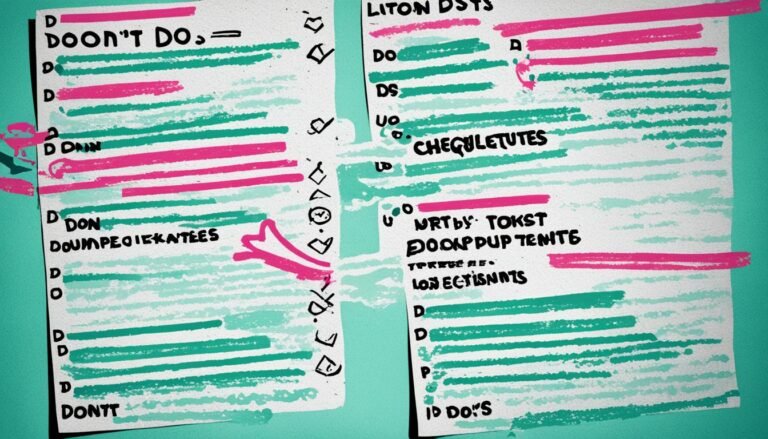Is looking at other girl cheating?
When it comes to maintaining a healthy and faithful relationship, the question of what constitutes as cheating can be a sensitive topic. One of the most common concerns that arise is whether looking at other girls can be considered as infidelity. It’s important to establish clear boundaries and expectations with your partner to avoid misunderstandings and potential breaches of trust.
There are several signs of cheating in a relationship, including secrecy, sudden changes in behavior, and a lack of intimacy. It’s important to recognize these red flags and address them with your partner to prevent any further harm to the relationship.
Key Takeaways:
- Looking at other girls can be a sensitive topic in a relationship.
- Establishing clear boundaries and expectations with your partner can prevent misunderstandings and breaches of trust.
- Signs of cheating in a relationship include secrecy, sudden changes in behavior, and a lack of intimacy.
Understanding Emotional Cheating
When it comes to cheating in a relationship, physical infidelity is not the only form of betrayal. Emotional cheating, although often overlooked, can be just as damaging to a relationship. It involves forming a deep emotional connection with someone other than your partner, which can lead to secrecy, lies, and ultimately, the breakdown of trust.
Signs of a Cheater: It’s important to be aware of the signs of emotional cheating, as they may be more subtle than those of physical cheating. Your partner may seem distant or preoccupied, and may prioritize spending time with someone else over you. They may also become defensive or secretive when questioned about their behavior and may express feelings of guilt or shame.
Quote: “The line between friendship and emotional cheating can sometimes be blurry, but if you find yourself confiding in someone else more than your partner or sharing intimate details about your relationship, it may be time to reevaluate the boundaries of your relationship.” – Dr. Jane Smith, licensed therapist
It’s important to note that emotional cheating can be just as damaging as physical cheating, and should not be dismissed as insignificant. If you suspect that your partner is engaging in emotional infidelity, it’s important to address the issue head-on and communicate openly about your concerns. Ignoring or denying the issue will only make it worse and can ultimately lead to the end of the relationship.
Remember, a healthy and happy relationship is built on trust, honesty, and open communication. If you or your partner are struggling with emotional infidelity, seek the help of a licensed therapist or counselor who can provide guidance and support in navigating this complex issue.
Recognizing Physical Cheating
Physical cheating is a serious breach of trust in a relationship. It involves engaging in physical acts of intimacy with someone other than your partner. While different people have different boundaries, physical cheating generally involves sexual interaction, kissing, touching, or any other activity that would be considered intimate.
It is essential to note that physical cheating does not necessarily involve intercourse. Any physical act that violates the agreed-upon boundaries of a relationship constitutes cheating.
Signs of Physical Cheating
If you suspect that your partner is physically cheating on you, it’s essential to look for the following signs:
- Your partner starts to pay more attention to their appearance, wearing new clothes and spending more time grooming.
- Your partner begins to distance themselves from you, emotionally and physically. This could include sudden disinterest in activities or plans you used to enjoy together, or a lack of physical affection.
- You notice unexplained marks on your partner’s body, such as hickeys or bruises.
- Your partner becomes more secretive about their phone or computer, guarding their privacy fiercely.
If you notice these signs, it does not necessarily mean that your partner is physically cheating on you. However, it is essential to have a frank discussion about your concerns to maintain open communication and trust within your relationship.
Dealing with a Cheating Spouse
Dealing with a cheating spouse can be a daunting task, but it’s important to approach the situation with a cool head. Remember that cheating is a choice, and it’s not a reflection of your worth as a person.
If you suspect that your partner is cheating, the first step is to talk to them about your concerns. Be honest and direct, but avoid accusations and blame. Share your feelings and ask them to be transparent about their actions.
If your partner has admitted to cheating, it’s important to take time to process the situation and decide what you want to do next. Some couples may choose to work through the issue together, while others may decide to end the relationship.
Remember that rebuilding trust takes time and effort, but it is possible. It’s essential to seek professional help if you’re struggling to cope with the aftermath of cheating. A therapist can provide you with the tools and guidance you need to heal and move forward.
Signs of Cheating Boyfriend/Girlfriend
If you’re in a dating relationship and suspect that your partner is physically cheating on you, look for the same signs mentioned above. Physical cheating is a violation of trust, regardless of whether you’re in a romantic or committed relationship.
It’s important to have open communication and set clear boundaries from the beginning of a relationship to avoid misunderstandings or breaches of trust down the line.
The blurred lines of an emotional affair
Emotional affairs are often hard to define since they are not necessarily sexual but still breach the boundaries of emotional intimacy with someone other than your partner. Unlike physical affairs, emotional cheating may not involve physical contact, but it can still pose a significant threat to a relationship and cause severe emotional pain for the betrayed partner.
If you find yourself constantly thinking about someone other than your partner, sharing your deepest thoughts and feelings with them, and relying on them for emotional support, it may be a sign that you are having an emotional affair.
“Emotional infidelity is when a person not only invests more of their emotional energy outside their primary relationship but also receives emotional support and companionship from the new relationship,” – Shirley Glass, psychotherapist and author of Not “Just Friends: Rebuilding Trust and Recovering Your Sanity After Infidelity”.
Emotional affairs can happen to anyone, and they often start innocently enough, perhaps as a friendship or professional relationship. However, when the lines of emotional boundaries get blurred, it is essential to take a step back and reassess the situation.
If you suspect that your partner may be engaging in an emotional affair, it is crucial to communicate your feelings honestly and openly. Be specific about the behaviors that make you uncomfortable and ask questions to gain clarity on what is happening. It is also essential to establish boundaries and rebuild trust by setting clear expectations and working together towards a healthier relationship.
Remember, emotional affairs may not involve physical contact, but they can still cause significant harm to a relationship. Building a strong foundation of open communication, trust, and mutual respect is essential in preventing emotional infidelity and maintaining a healthy, loving, and committed relationship.
Navigating the complexities of infidelity
Infidelity can take many forms, and the signs of cheating in a relationship may vary depending on the individual. It’s essential to have open communication and trust with your partner to maintain a healthy and faithful relationship. In this section, we will discuss the different forms of infidelity and their potential consequences.
Types of Infidelity
- Emotional Infidelity: Emotional infidelity occurs when an individual develops an intimate emotional connection with someone other than their partner. This emotional connection can sometimes lead to physical infidelity. Signs of emotional infidelity include excessive communication, secrecy, and inappropriate language.
- Physical Infidelity: Physical infidelity is when an individual engages in sexual activity with someone other than their partner. This type of infidelity is often easier to spot than emotional infidelity, as there may be physical evidence or changes in behavior.
- Micro-Cheating: Micro-cheating involves engaging in small, seemingly harmless actions that can lead to emotional or physical infidelity. Examples include hiding communication with someone from your partner, flirting, or keeping a secret from your partner.
Consequences of Infidelity
Infidelity can have a devastating impact on a relationship. It can lead to a lack of trust, emotional pain, and even the end of the relationship. When infidelity occurs, it’s essential to address it openly and honestly with your partner. Seeking professional help may also be necessary to work through the emotional trauma and rebuild trust.
Remember, cheating on your partner is a betrayal of their trust and can have long-lasting consequences. If you suspect your partner is cheating, it’s important to address your concerns directly and honestly.

By understanding the different forms of infidelity and the potential consequences, you can make informed decisions and work towards maintaining a healthy and faithful relationship.
Coping with suspicions and trust issues
If you are experiencing suspicions and trust issues in your relationship, it can be a difficult and emotionally taxing situation. It’s important to understand that these feelings are valid, and it’s okay to seek help in navigating them.
One of the most crucial steps you can take is to have open communication with your partner. It may be uncomfortable, but it’s important to express your concerns and share how you feel. Avoid accusations, instead use “I” statements to express how their actions or behavior make you feel.
In some cases, seeking the help of a professional therapist can be beneficial. A therapist will provide a safe and neutral environment where you and your partner can work through your issues and rebuild trust.
It’s also important to take care of yourself during this time. Find healthy outlets for your emotions, such as meditation, exercise, or talking to a trusted friend or family member. Remember, you are not alone in this.
If you suspect that your partner is cheating, try to gather evidence before confronting them. Keep in mind that jumping to conclusions can cause more harm than good.
However, if you do find evidence of infidelity, it’s important to approach the situation calmly and rationally. Avoid blaming or attacking your partner, but express how their actions have affected you. It’s important to take time to process your emotions before making any major decisions.
Remember, coping with suspicions and trust issues takes time and effort from both you and your partner. It’s important to remain patient and committed to rebuilding trust.
Signs of a cheater
- Disappearing for long periods of time without explanation
- Becoming defensive or aggressive when questioned about their whereabouts
- Showing a sudden lack of interest in sex or intimacy
- Acting distant or emotionally unavailable
- Keeping their phone or computer private
- Having secret social media accounts
Cheating spouse
If you have discovered that your spouse is cheating, it can be a devastating experience. It’s important to remember that you have the right to feel angry, hurt, and betrayed.
Once you have gathered evidence, it’s important to have an honest and open conversation with your spouse. Avoid blaming or attacking them, but express how their actions have made you feel.
It’s also important to take time to process your emotions before making decisions about the future of your relationship. Some couples are able to work through infidelity with the help of a therapist, while others may choose to end the relationship.
Whatever you decide to do, remember to prioritize your mental and emotional well-being. Take care of yourself and seek support from loved ones or a professional therapist.
Conclusion
After exploring the various aspects of infidelity and cheating in a relationship, it’s clear that there are many forms of cheating beyond physical interactions. Emotional cheating and emotional affairs, in particular, can have a significant impact on a relationship. It’s crucial to understand the signs of a cheater and recognize the red flags that may indicate that someone is engaging in infidelity.
If you suspect that your partner is cheating, it’s important to have open and honest communication about your concerns. Seeking professional help can also be beneficial in navigating these complex situations. Rebuilding trust in a relationship after infidelity can be challenging, but it’s possible with time and effort.
Remember that maintaining a faithful and healthy relationship requires work, commitment, and honesty. By understanding the signs of cheating in a relationship, you can make informed decisions and work towards creating a strong foundation for your partnership. Keep the lines of communication open, be honest with each other, and never be afraid to seek help when you need it.
Thank you for taking the time to read this article. We hope it has provided you with valuable insight into the complex topic of infidelity and cheating in relationships. Take care, and we wish you the best in your future endeavors.
FAQ
Is looking at other girls cheating?
Looking at other girls alone is not considered cheating. However, if it involves a breach of trust or emotional and physical involvement with someone outside the relationship, it can be considered a form of infidelity.
What are the signs of cheating in a relationship?
Signs of cheating can vary, but some common indicators include secretive behavior, increased need for privacy, sudden changes in schedules, decreased intimacy, and unexplained absences.
What is emotional cheating?
Emotional cheating occurs when one partner forms a deep emotional connection with someone other than their significant other, often sharing intimate thoughts and feelings.
How can you recognize physical cheating?
Signs of physical cheating can include changes in sexual behavior or preferences, unexplained marks or injuries, sudden changes in appearance, and the presence of suspicious messages or evidence.
What is an emotional affair?
An emotional affair refers to a situation where a person develops an emotional connection and intimacy with someone other than their partner, without any physical involvement.
What are the consequences of infidelity?
Infidelity can lead to trust issues, emotional pain, and damage to the relationship. It can result in a loss of intimacy, communication breakdown, and, in some cases, the end of the relationship.
How can I cope with suspicions and trust issues?
Coping with suspicions and trust issues requires open communication, seeking professional help if needed, and rebuilding trust through honesty, transparency, and consistent actions.






